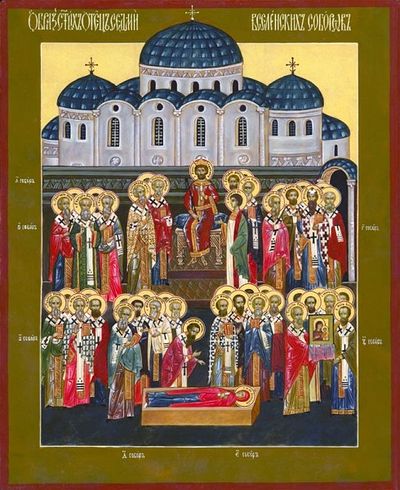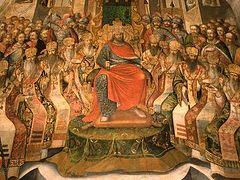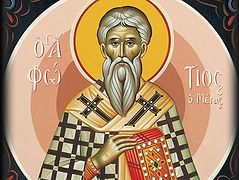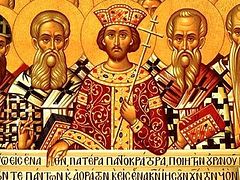We do not believe that everything that anyone happened to say at an Ecumenical Council is infallible, but we most certainly do believe that the canons and decrees of the Ecumenical Councils are infallible, and this is because we believe that the Church as a whole, is infallible. Individual members, and even local Churches may err, but it is not possible for the entire Church to teach that which is erroneous—and Ecumenical Councils are certainly an example of what the Church as a whole teaches.
Fr. George Florovsky observed: “The teaching authority of the Ecumenical Councils is grounded in the infallibility of the Church. The ultimate ‘authority’ is vested in the Church, which is forever the Pillar and the Foundation of Truth”[1]
The Patriarchal Encyclical of 1895,[2] which was written in response to a Papal encyclical by Pope Leo XIII, in which he called for the reunion of the Orthodox Church with the Roman Church, states:
“Having recourse to the fathers and the Ecumenical Councils of the Church of the first nine centuries, we are fully persuaded that the Bishop of Rome was never considered as the supreme authority and infallible head of the Church, and that every bishop is head and president of his own particular Church, subject only to the synodical ordinances and decisions of the Church universal as being alone infallible, the Bishop of Rome being in no wise excepted from this rule, as Church history shows.”
And St. Nicodemus of the Holy Mountain states, as he begins his famous commentary on the Ecumenical Canons:
“So every Ecumenical Council that possesses these characteristic features is in fact the Holy and Catholic Church itself in which in the Symbol of Faith (called the Creed in English) we profess to believe. ...being infallible and sinless. For the Church, which the Ecumenical Council takes the place of as its personal representative, is a pillar and framework of the truth, according to St. Paul (1 Tim. 3:15); accordingly, whatever seems right to Ecumenical Councils seems right also to the Holy Spirit of Truth: for, it says, He shall teach you all things and remind you of everything I have said unto you (John 14:26).”[3]
Canon 1 of the Seventh Ecumenical Council states, with regard to all the Ecumenical canons and decrees of the previous Councils (as well as those of local Councils and Fathers whom these Councils specifically affirmed), states:
“For those who have been allotted a sacerdotal dignity, the representations of canonical ordinances amount to testimonies and directions. Gladly accepting these, we sing to the Lord God with David, the spokesman of God, the following words: I have delighted in the way of thy testimonies as much as in all wealth, and thy testimonies which thou hast commanded witness righteousness,… Thy testimonies are righteousness forever: give me understanding, and I shall live (Ps. 119:14, 138 and 144). And if forever the prophetic voice commands us to keep the testimonies of God, and to live in them, it is plain that they remain unwavering and rigid. For Moses, too, the beholder of God, says so in the following words: To them there is nothing to add, and from them there is nothing to remove (Deut. 12:32). And the divine Apostle Peter, exulting in them, cries: which things the angels would like to peep into (1 Pet. 1:12). And Paul says: Though we, or an angel from heaven, should preach to you any gospel besides that which ye have received, let him be anathema (Gal. 1:8). Seeing that these things are so and are attested to us, and rejoicing at them as one that findeth great spoil (Ps. 119:162), we welcome and embrace the divine Canons, and we corroborate the entire and rigid fiat of them that have been set forth by the renowned Apostles, who were and are trumpets of the Spirit, and those both of the six holy Ecumenical Councils and of the ones assembled regionally far the purpose of setting forth such edicts and of those of our holy Fathers. For all those men, having been guided by the light dawning out of the same Spirit, prescribed rules that are to our best interest. Accordingly, we too anathematize whomsoever they consign to anathema; and we too depose whomsoever they consign to deposition; and we too excommunicate whomsoever they consign to excommunication; and we likewise subject to a penance anyone whom they make liable to a penance. For Let your conduct be free from avarice; being content with such things as are at hand (Heb. 13:5), explicitly cries the divine apostle Paul, who ascended into the third heaven and heard unspeakable words (2 Cor. 12:2-4).”
And St. Nicodemus of the Holy Mountain adds two comments in his notes to his commentary on this canon:
“Note here how respectable and reverend the divine Canons are. For this holy Council, by calling them ‘testimonies’ and ‘justifications,’ and the like, dignifies these very same divine Canons with those title and names with which the divinely inspired and holy Bible is dignified.”
And:
“That is why Photius, in Title I, ch. 2, says that the third ordinance of Title II of the Novels invests the Canons of the seven Councils and their dogmas with the same authoritativeness as the divine Scriptures” (Rudder, p. 428f).





Sr. Vassa (Lerin) said that no one is willing to argue some canons should be dropped altogether, they are nonetheless not enforced. at least once a later council changed an earlier canon and Trullo 102 essentially enshrines economia, recognizing that stern application may instead of curing sin contribute to it, inducing despair or whatever. I heard a Greek say concern about non exsanguinated meat or blood added is Islamic.